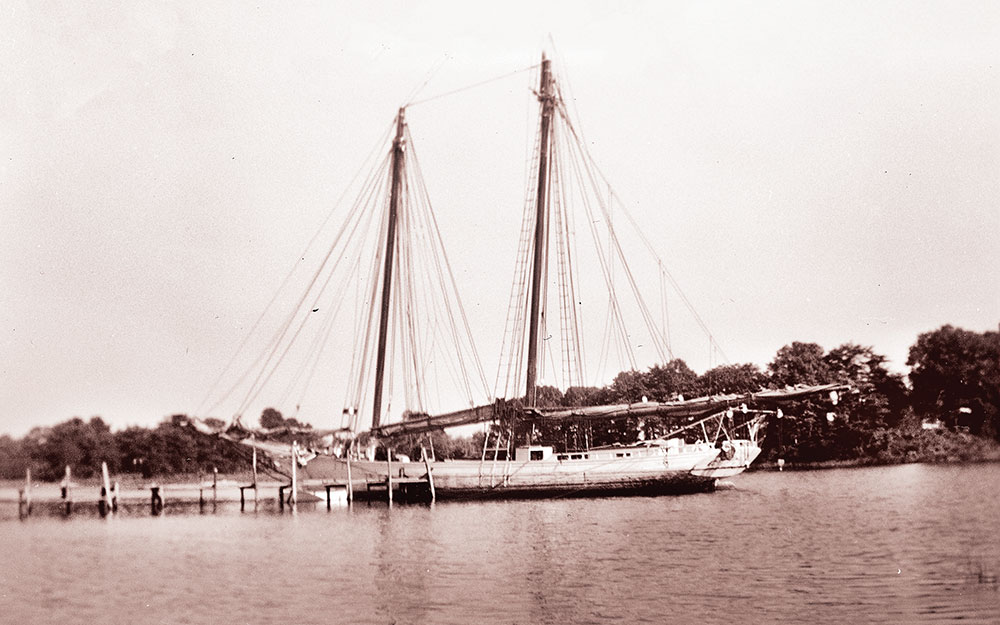
by Larry Chowning –
The year 1874 was a signature year for the community of Mundy Point in Northumberland County as during that year the District of Columbia Fishing Club and the community of Mundy Point became synonymous.
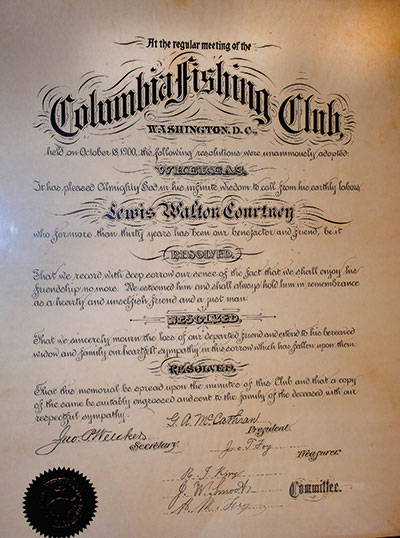
Sometime during that year, a group of men came to Mundy Point from Washington, D.C., and talked to Lewis Walton Courtney who had established “Pride of Virginia,” a thriving seafood/vegetable canning business at the point, to allow them to use one of his buildings as a lodge for the club.
Courtney’s great-grandson, Lewis Courtney of Mundy Point, has some recollections of the club. “About 10 members of the club would come because that is what the building would hold,” said Courtney. “I think they would coordinate in Washington through the year with its members use of the lodge building.”
He continued, “It was actually a fishing and hunt club and the first year they came they had a schooner built here at Mundy Point. It was named after the club (Columbia F.C.),” he said. “They used it in Washington to take cruising trips and to take members back and forth here to the lodge.”
The schooner Columbia F.C. was also used for lodging at Mundy Point when more than 10 members wanted to stay. Members would also bunk on the boat and that way they could get more members on each trip, said Courtney. The vessel was 79-feet long by 22.8-feet wide and had bunks in the forepeak and hold.
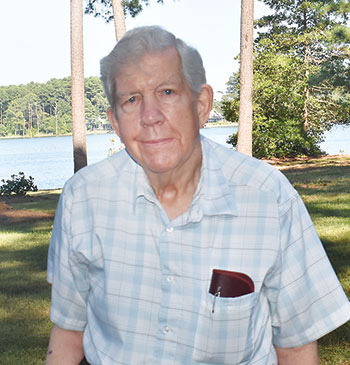
“People would come for a week or two and then they’d go home and another group of men would come,” said Courtney. “During the winter hunting season, I’ve been told they would kill hundreds of ducks and geese and the birds would be hung on poles outside of the lodge where they would freeze at night. The ducks were picked and either cooked inside the lodge or taken back to Washington for members to eat.
“They pretty much fed themselves, but they would buy some supplies from my great-grandfather’s store and they brought some food from Washington,” said Courtney. “My great-grandfather bought the (schooner) Columbia F.C. from the club in 1900 for $1,450.” The sale agreement between the parties is part of the Courtney family collection.
Lewis W. Courtney died later in 1900 and at that time the Columbia Fishing Club approved a resolution to honor him. Club members in Washington unanimously approved a resolution honoring him for his longtime support of the group. A framed resolution dated Oct. 18, 1900 was presented to the family. Today, that resolution hangs on the wall in his great-grandson’s home at Mundy Point.
The resolution states, “That we sincerely mourn the loss of our departed friend and extend to his bereaved widow and family our heartfelt sympathy in this sorrow which has fallen upon them.” It was signed by president of the club G.A. McCathran and others.
With the death of Lewis W. Courtney, his son Warren J. Courtney took over the business. The Columbia Fishing Club eventually moved from Mundy Point to Lewisetta, where they occupied several buildings. It was there into the 1920s when the club stopped coming.
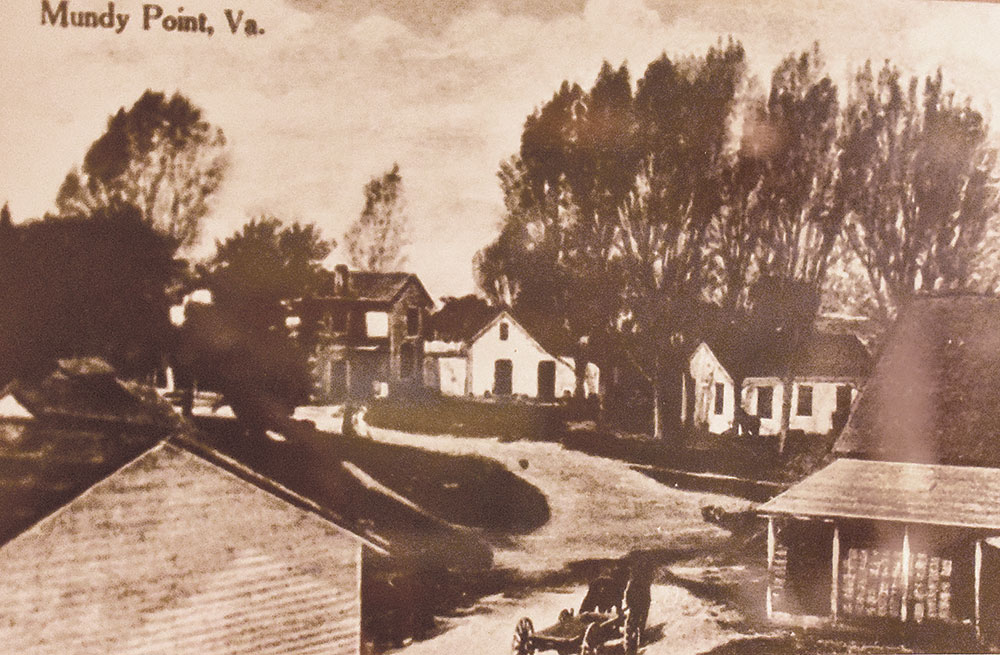
Columbia F.C. and the Ruarks of Deltaville
Warren Courtney sold the Columbia F.C. in 1910. The boat remained on Chesapeake Bay until it was sold again in 1947, when it went south to Cuba. At the end of its life, the vessel was captained and owned by the Ruark family of Deltaville, which used the boat as a freighter.
In the early 1990s, brothers Edmond and Talmadge Ruark of Deltaville sat down and talked about their recollections of the Columbia F.C. “I bought the Columbia F.C. in 1942,” said Edmond. “We hauled mostly lumber, but also carried fertilizer, coal, empty tomato cans, watermelons and barrel staves.
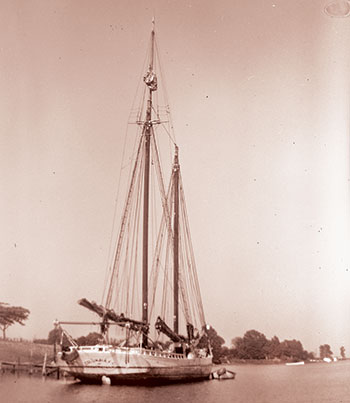
“We’d get between $1.50 and $3.50 per thousand board feet for hauling lumber and the Columbia would carry about 75,000 board feet,” he said. “It would carry 9,000 cases of tomato cans and we got about one and a half cents a case for freighting it. And we could haul up to 14,000 watermelons.
“It wasn’t great money in it,” said Talmadge. “The only time you made good money was when you could make a *down trip. If you could carry a load of lumber to Baltimore and have a few tons of fertilizer, say 50 to 75 tons, or so many cans to bring back to one of the factories, then you could make a little money by having two paid trips.
“You see, there were (vegetable) canning factories all through the county (Middlesex) and on the Northern Neck and Middle Peninsula,” said Talmadge. “Earl Daniel and Bernard Wood had factories in Amburg and Hartfield, and there were certain times of the year they would hire us to bring them cans.
“If you had to come back from Baltimore light, you didn’t make much money,” said Talmadge.
Edmond said, “we did not have much expense. If we carried a crew, we paid each one a dollar a day — $30 a month. One trip to Baltimore with a load of lumber usually brought us $180.
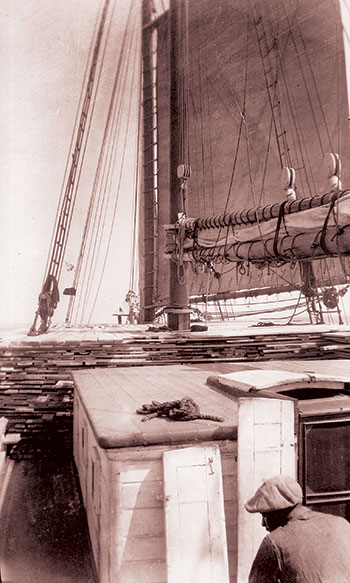
“I’ve seen it when we could sail from Deltaville to Baltimore in 12 hours, but that wasn’t often,” said Edmond. “Sometimes, if you made a trip in a week, darn if you wasn’t doing good. In the wintertime, when there were ice-ups it might take three weeks to get a load to Baltimore.
“The Columbia F.C. was a nice vessel but towards the end there wasn’t much to haul but oysters,” said Edmond. “When the big lumber mills started closing and trucks and roads got bigger and better, it just wasn’t much work for us.”
When Edmond sold the vessel in 1947, it marked the end of an era of God’s wind, sail and wooden boats as a driving force in the economic and social life of the bay. The Columbia F.C. was built to accommodate the pleasures of the members of the fishing club and was later transformed into a working freight boat.
Its name “Columbia F.C.” was a living reminder for nearly three-quarters of a century on the bay of the club and a way of life that has long since passed.


